It’s a common behavior we see in our faithful friends, lying on the floor or in their beds, licking or chewing at their paws. But, why do dogs lick and chew their paws?
More often than not we will simply brush it off that they’re grooming themselves, especially if you haven’t long come in from a walk.
But is there something else going on?
Is it simply a grooming behavior or could it indicate something more?
Let’s have a look at some of the reasons which keeps your dog licking their paws!
TABLE OF CONTENTS
- 1. Your Dog Has An Allergy (Environmental, Food or Cleaning Products)
- 2. Fido Is Anxious (Fear or Age Related)
- 3. Spot Is Bored - Time to Play
- 4. Rover Has a Hormone Imbalance (Thyroid Related)
- 5. Your Dog Has Dry Skin (Dermatitis)
- 6. Rover is Grooming His Coat
- 7. Your Dog Has Fleas or Ticks
- 8. Spot Is In Pain (Paws, Wounds or Stings)
- How to Stop Dogs From Licking Their Paws
- Summary
1. Your Dog Has An Allergy (Environmental, Food or Cleaning Products)
An easy sign to miss, but dogs licking paws is regularly associated with allergies.
If you notice your dog excessively licking their paws after going for a walk, it may be an allergy to something in their environment – grass, pesticides or plants.
Top Tip
To establish whether your dog has an environmental allergy, it can help to rinse your dog off when returning from a walk to see if this improves their symptoms.
Regular, excessive licking that isn’t associated with any other behavior could indicate a food intolerance or allergy. The most common food allergies in dogs are beef, chicken and dairy. It is also possible for dogs to be allergic to grains.
Veterinarians can carry out allergy testing on dogs, but it is more common to attempt an elimination diet to establish what your dog is allergic to. This consists of feeding your dog a reduced diet of specific products to establish whether their symptoms improve when excluding the common culprits.
Dogs can also be allergic to the cleaning products we use in our homes – if you think this may be causing a reaction, swap out products to see if your dog’s symptoms improve.
Ensure your home is clean of dust and mold as these can cause problems for dogs too.
2. Fido Is Anxious (Fear or Age Related)
When we consider why dogs lick us humans, we look back to puppyhood; mothers spend a great deal of time licking their offspring. We know that this maternal behavior is linked to more resilient and less stressed dogs as they grow.
Licking is thought to reduce stress hormone levels in a dog’s body. It would make complete sense that when your dog is feeling anxious, they would lick their paws to reduce their stress levels.
Establish what is making your dog feel anxious.
It could be fear-related (e.g. loud noises, new people, new pets brought into the house, a change in routine, separation, or grieving after the passing of another pet), or age-related as some dogs develop anxiety as they get older due to a decline in thinking, learning, and memory.
You may notice other anxious symptoms like excessive panting, urinating, defecating, aggression, crying, barking, or whining.
Speak with a veterinarian or behaviorist if you think your dog may be suffering from anxiety.
3. Spot Is Bored – Time to Play
As we have mentioned, dogs may lick their paws to make themselves feel better (e.g. cope with anxiety).
This would explain why a dog may lick their paws if they are bored! Boredom actually increases levels of the stress hormone, cortisol and paw licking reduces that stress hormone.
As with humans, a dog’s experience of boredom is subjective. It will depend on their breed and how active they are. An intelligent dog (e.g. Puggle), will require far more attention and brain stimulation.
Ensure you are meeting their daily exercise quota. Spend time working on training and play some brain games. If you have to leave your dog alone for short periods of times, allow them space to roam in the house and leave toys for them to play with.
A brilliant dog boredom buster is a raggy toy:
- If you have an old pillow case – cut it into three sections.
- Tie the ends of the sections together.
- Plait (i.e. Braid) the three sections and tie the end.
- Insert small treats into the folds of the plait.
- Your dog will forage through the folds to get to the treats.
When a dog licks themselves due to anxiety or boredom it can often result in lick granulomas. These present as open sores on the skin. The more the dog licks it, the bigger it gets. Certain breeds are more predisposed to lick granulomas including: the Doberman, German Shepherd, Labrador Retriever, Weimaraner and the Irish Setter.
4. Rover Has a Hormone Imbalance (Thyroid Related)
When a dog doesn’t produce the required thyroid hormones in cases of hypothyroidism (too little) and hyperthyroidism (too much) it can result in hair thinning, shedding and loss.
Dogs are more likely to lick exposed skin which results in more common lick granulomas.
Lick granulomas can become large in size and appear like open wounds. Whilst a dog’s instinct is to lick a wound, and we know their saliva has antibacterial properties that can aid healing, there is fine line between allowing them to keep a wound clean and actually making it worse.
In consultation with your veterinarian, it is often best to keep a lick granuloma covered so it can heal.
Often when the hormone imbalance is treated, licking behavior will stop.
5. Your Dog Has Dry Skin (Dermatitis)
You may notice flakes of skin through his coat or when he is scratching himself. Their skin may also be red or bumpy. Dogs may lick themselves to soothe the irritation.
Dry skin in dogs is often caused by excessive bathing or grooming schedules. As much as we like our pooches to be clean, it is possible to over-bath them; this is common with designer breeds.
This strips their skin and hair of it’s natural oils – much like it does in humans if you wash your hair every day.
Read the labels on the shampoos you use – harsh chemicals or soaps can dry their skin and coat out. Speak with a qualified groomer or your veterinarian if you are concerned about your dogs skin or coat.
6. Rover is Grooming His Coat
Another reason you may see your dog licking their paws is because they are grooming themselves.
You may have been for a walk or they’ve been out in the yard.
Grooming behavior is easy to notice as your dog will lick each of their paws; not focusing specifically one one paw.
They may also gnaw or nibble at their paw if they have something stuck to or in their paw; this is pretty typical behavior.
7. Your Dog Has Fleas or Ticks
Tick infestation is a growing problem in the US and UK with dogs at risk who walk frequently in areas with lots of wildlife (e.g. woodland).
Not only can some dogs be allergic to fleas and ticks, the irritation caused by an attached flea or tick can cause a dog to lick themselves. The saliva of fleas or ticks causes an immune mediated response which results in an “itch” sensation.
Your dog will either scratch or lick the site; firstly in a hope to remove the pest and secondly in a hope to soothe the area. Even as humans, as much as we know we shouldn’t scratch a bite – we all know how satisfying it is.
Use flea and tick repellents on your dog and if you notice him scratching or licking himself more often than usual, check his coat with a flea comb.
Top-Tip
Keep you home flea and tick free with regular vacuuming and frequently wash soft furnishings and rugs.
If you are concerned your dog has a serious flea or tick infestation seek advice from your veterinarian.
8. Spot Is In Pain (Paws, Wounds or Stings)
One of the easily missed signs of pain is paw licking. This could be caused by a foreign object in the paw such as a grass seed or thorn. Take a look at his paw pad and feel in between his pads.
Look for any open wounds or insect stings.
Paw licking can also be a sign of pain further up the leg. Dogs who over-exert themselves can sprain their legs just like humans can.
You may also notice limping or resting more than usual. This is usually localized to one area so relatively easy to notice. A veterinarian can advise you on the best course of action.
How to Stop Dogs From Licking Their Paws
It is important to first establish the reason why your dog is licking their paws before trying to modify this behavior.
If it is relating to a health issue (e.g. Anxiety, Hormones, Dermatitis, etc…) it is essential to seek advice from your veterinarian. Once the health issue has been resolved, you should notice the paw licking disappears too.
In cases of lick granulomas, when unsupervised, it may be easier to cover the site to allow it to heal properly. If you are able to supervise, it is possible to distract your dog with chews, games or simply by command.
If health reasons have been ruled out and your are concerned your dog is suffering with anxiety or boredom, there are a number of things you can do.
If possible, seek advice from a force-free behaviorist. They will be able to help you understand what is causing your dog to lick their paws.
Once you have identified the trigger, it is possible to desensitize and counter-condition your dog’s response.
If we consider separation as the source of anxiety, one of the first steps may include introducing a barrier into the home. This is to help your dog learn to be away from you.
With the barrier in place, they can still see you, but they are not directly with you. This barrier situation may only be introduced for up to 30 minutes at a time in the first instance.
You may introduce interactive toys or chews on the other side of the barrier. You are counter conditioning the response so they learn that being away from you is actually not that bad!
If you are concerned your dog is bored, we have a handy checklist to run through:
- Is your dog getting enough exercise? Regular, daily walks?
- Do they have opportunities to play with toys?
- Are you spending time on training and socialization (even as adult dogs)?
- If they are left alone, is a dog walker or friend/ family member popping in to see them?
If you dog is bored, you may notice lots of digging, chewing, barking, howling, crying and pacing.
Top tips for reducing boredom:
- Work on simple obedience training,
- Play with them,
- Mix up the daily walk – change routes,
- Work on some brain games,
- Allow them plenty of space to roam within the home,
- Groom them,
- Allocate boxes for toys and swap which boxes you have out every couple of days – dogs do get bored with the same toys,
- Feed their meal in a slow feeder or a stuffed toy.
Summary
Dogs licking paws wasn’t quite as simple as we first thought; there are actually a number of reasons why your dog may be licking their paws.
Whilst it is typical for dogs to groom themselves by licking, it can also signal an underlying issue as to why dogs lick.
Paw licking can be a sign of pain, allergy, boredom, anxiety, dry skin, hormone imbalances or the presence of fleas or ticks.
If you are concerned there is an underlying health issue, seek veterinarian advice.
A force-free behaviorist can help you understand if your dog is suffering from anxiety.
If you are concerned your faithful friend may just be bored, try to include some of our top tips and let us know how you get on below.
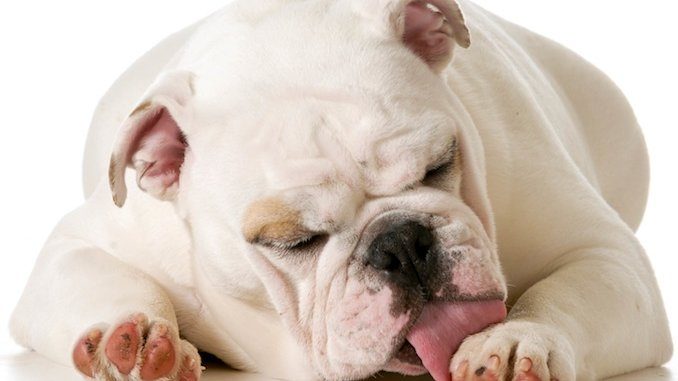

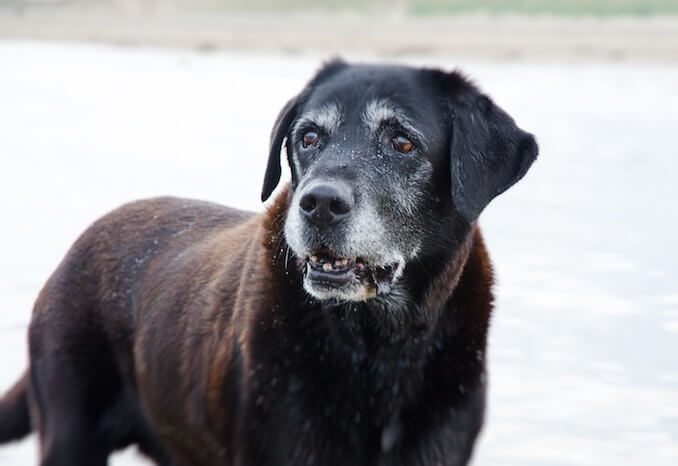

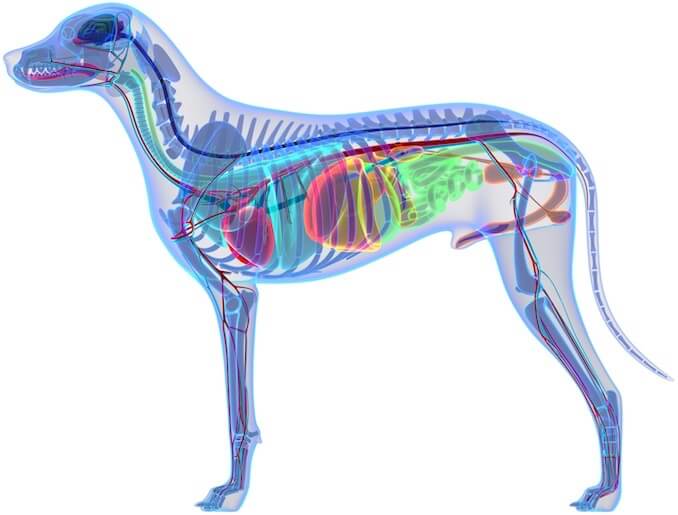

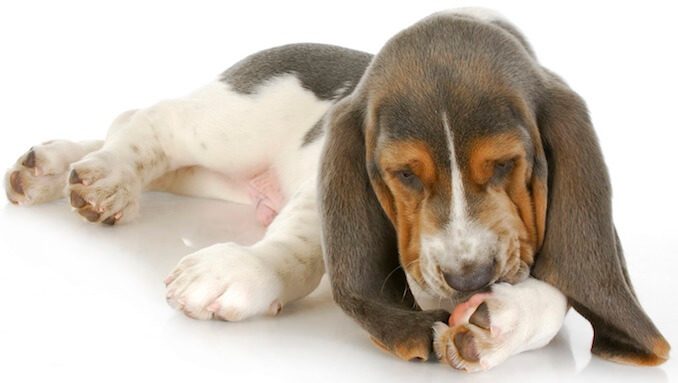

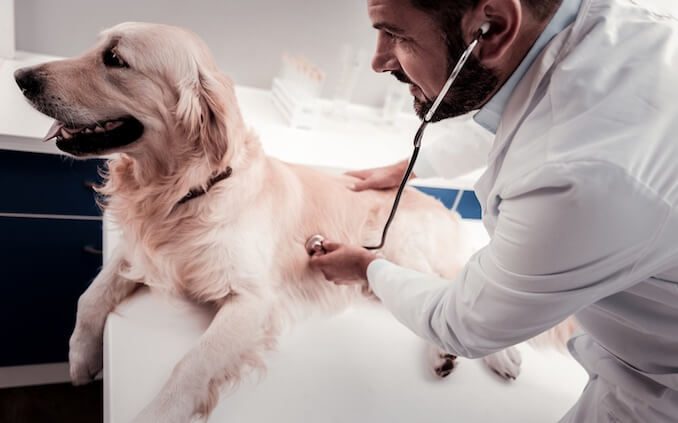

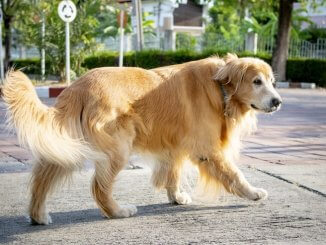
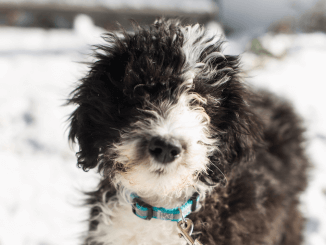
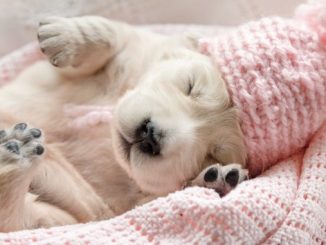
Hi, I have a 2year old mini golden doodle. He has hot spots. I have tried everything. Once there healed and i take the cone off he goes right back licking them again. What should I do? I have changed his food. I got special shampoo and creams for him. Nothing works.
Hi Mary, what type of diet are you feeding him?
If my dog licks her paws alot and seems content while doing so and it doesn’t hinder her or cause hot spots or redness, can i just let her enjoy herself?
Yes provided you have had her paws checked.
I used canine advantage on my dog 3weeks ago and hes still licking and biting on himself what should i do?
Hi Latasha,
Have you taken your dog to the vets to discuss this? Was he licking and biting himself prior to treatment? Did you apply the treatment at home, if so, where on his body did you apply it?
My Poodle licks and bites at his toes after being groomed since the feet are trimmed clean and free from hair in between his toes. He doesn’t seem to be in pain he just seems to be annoyed that his hair is so short? He licks like crazy, and doesn’t stop, and then bite his nails to chew on his toenails?
Hi Drew,
Your Poodle could be irritated by the groom or the fact that he has been shaved. Some dogs to get blade irritation. I’d be mindful of whether he is doing this at any other time. Frequent licking or nibbling at paws can often be a sign of allergies (environmental or food).
Keep an eye on him and if the behaviour continues, pop to see your Veterinarian to rule out any underlying issues.
Hi, our Tibetan Terrier cross licks and bites at her front paws. This causes her to cough to get rid of the hair in her mouth. She does not pull all the hairout. She has a thick coat. We live in Cape Town so could it be a heat intolerence? We can see no tangles or irritation.
Licking and biting at paws can be a sign of a range of issues in dogs; from intolerance to pain. It could be worth visiting your veterinarian to rule out anything that could be causing pain. It would also be worth mentioning intolerance. Intolerances can include both food and environmental. If you think it may be food related, try running an elimination diet of the usual culprits – chicken, beef and wheat. Eliminate one thing at a time so you can see if the symptoms improve. Loose stools, excessive tear staining or other digestive discomfort are often signs of food intolerance too. For some dogs, biting or licking their paws can be a symptom of stress so look for any other anxious behaviors too. Please seek professional advice if you are unsure of what is causing the behavior.
Our border collie used to get hotspots. We treated them with apple cider vinegar diluted in a little bit of warm water and then dabbed at the wound followed by a light coating of manuka honey. The vinegar cleaned the wound and the manuka honey healed it. Worked every time.
My dog continues to lick her front paws, I believe it is separation anxiety. We just lost her play mate 3 days ago and that is when this started pls let me know if I am on the right track.
Uzi does not get regular walking could this be the reason for paw licking.
I have an English bulldog female she is well-trained she is my service dog she is not an outside dog no fleas or ticks she eats good he is very clean I just don’t understand why she looks at her paws they are just Raw any advice would be nice
My 20month old Yellow Lab is always licking or chewing at his paws(in between his toes) but it’s only when he’s not on the go or at night, is it possible he’s just bored?
My Toy Pom licks his paw pads.all four paws and refuses to go for walks, which he loved, took him to the Vet he said it was most likely an allergy to Pollen and gave him Cortezon, which did not help at all